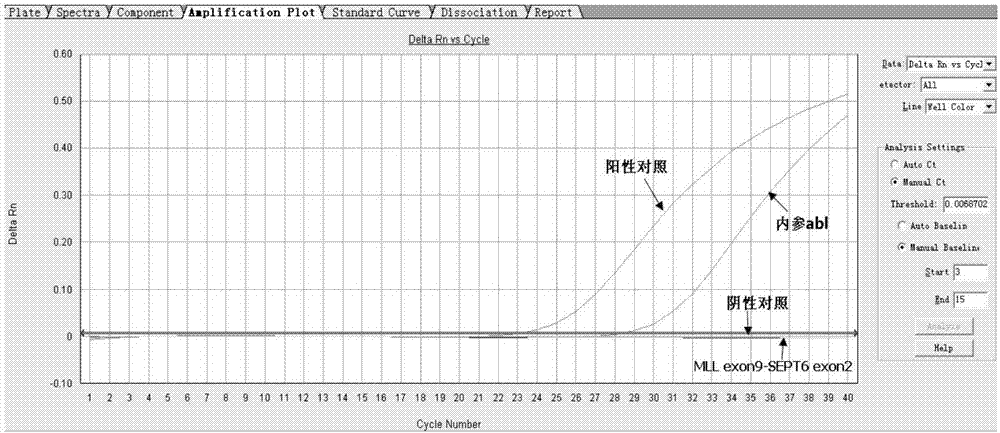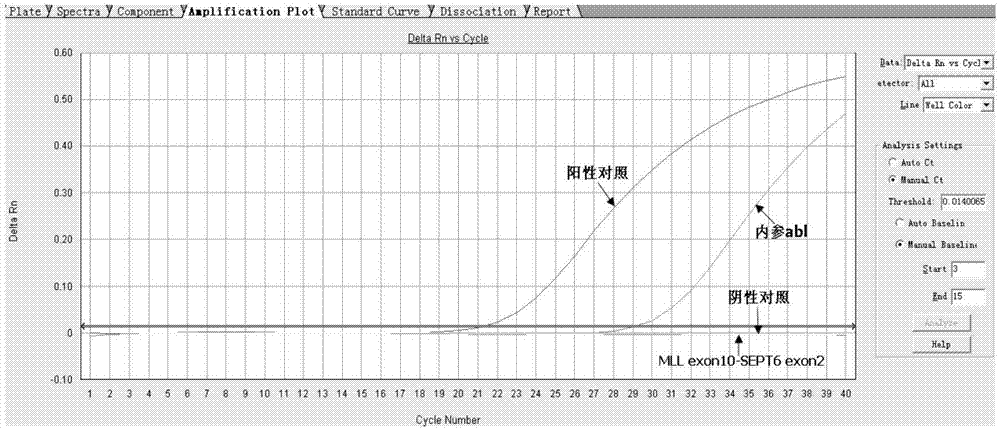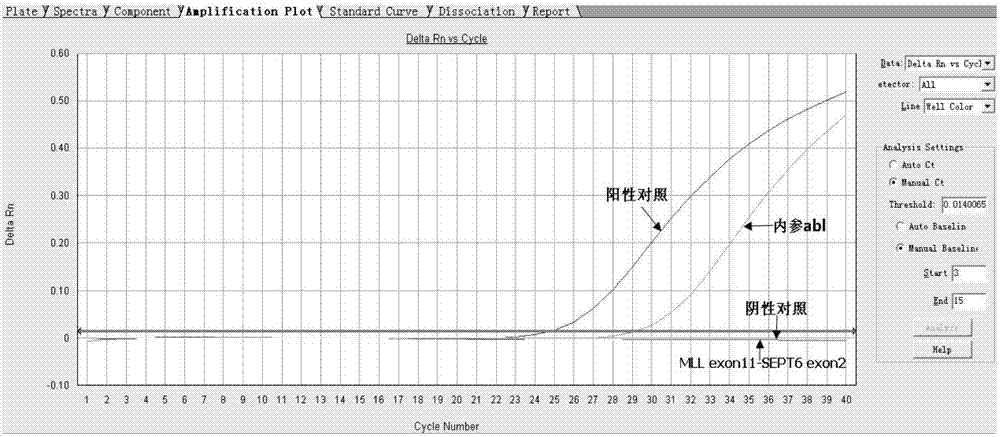Primer, probe and method for screening MLL-SEPT6 fusion gene of leukemia with real-time fluorescence PCR (polymerase chain reaction) technology
A technology that combines genes and real-time fluorescence, applied in the field of biotechnology detection, can solve the problems that karyotype analysis cannot meet MRD, cannot meet sensitivity at the same time, and has many PCR reaction systems, so as to avoid hematological recurrence, save detection time, and prevent The effect of clinical recurrence
- Summary
- Abstract
- Description
- Claims
- Application Information
AI Technical Summary
Problems solved by technology
Method used
Image
Examples
Embodiment 1
[0040]The method is used as an auxiliary indicator for early prevention and early diagnosis of human leukemia in clinic; it can also be used for relatively accurate screening of high-risk groups. Reagents include: erythrocyte lysate, TRIzol, chloroform, absolute ethanol, ReverTra Ace qPCR RT Kit (TOYOBO).
[0041] Detection system PCR reaction solution: ReverTra AceqPCR RT Kit (TOYOBO); THNDERBIRDProbe qPCR Mix (2×), MLL-SEPT6 upstream and downstream primers 0.32uM, MLL-SEPT6 probe 0.16uM; abl upstream and downstream primers 0.32uM , abl-probe (probe) 0.16uM; Wherein:
[0042] MLL(exon9)-F:GAACATCCTCAGCACTCTCTCC;
[0043] MLL(exon10)-F:TTGACTTCTGTTCCTATAACACCC;
[0044] MLL(exon11)-F:AAATTGGTGTTGTCGTCGTTG;
[0045] SEPT6(exon2)-R:CAAGCTGTCAAAACCCCACAT;
[0046] MLL-SEPT6-Probe:FAM-CCGAACTGTCCCCCCTGGCTG-TAMRA;
[0047] abl-F:GATACGAAGGGAGGGTGTACCA;
[0048] abl-R:CTCGGCCAGGGTGTTGAA;
[0049] abl-Probe:FAM-GCTTCTGATGGCAAGCTCTACGTCTCCT-TAMRA;
[0050] Positive control sub...
Embodiment 2
[0052] The operation flow of this method:
[0053] (1) Extract tissue RNA from blood: add 1ml of erythrocyte lysate to a clean 1.5ml centrifuge tube, take 0.5ml of anticoagulated blood and mix well. Let stand at room temperature for 10 minutes; centrifuge at 5000rpm for 5min, discard the supernatant, and collect the cells at the bottom; add 0.5ml red blood cell lysate again, centrifuge at 5000rpm for 5min, discard the supernatant, and collect the cells at the bottom; add 1ml TRIzol to the cells, and pipette repeatedly until the precipitation is complete Dissolve, let stand at room temperature for 5 minutes; add 0.2ml chloroform, shake evenly; centrifuge at 14000rpm at 4°C for 10 minutes, absorb the supernatant layer and transfer to another new centrifuge tube; add an equal volume of isopropanol, mix well up and down, and let stand at room temperature for 10 minutes Centrifuge at 14000rpm at 4°C for 10min, discard the supernatant, add 1ml of 75% ethanol, wash the tube wall upsi...
Embodiment 3
[0063] Clinical Sample Testing
[0064] Take 12 clinical samples to be tested, extract genomes, prepare reagents and detect according to the method described in Example 2.
[0065] Add 2ul of each sample to the detection system PCR reaction solution. At the same time, make positive, negative, and blank controls. Detect with a fluorescent PCR instrument for 100 minutes. The abl of all samples in the 12 screening samples had a line, but none of the samples of MLL exon9-SEPT6 exon2, MLL exon10-SEPT6 exon2 and MLL exon11-SEPT6 exon2 had a line.
[0066] The experimental results are as follows:
[0067]
PUM
 Login to View More
Login to View More Abstract
Description
Claims
Application Information
 Login to View More
Login to View More - R&D
- Intellectual Property
- Life Sciences
- Materials
- Tech Scout
- Unparalleled Data Quality
- Higher Quality Content
- 60% Fewer Hallucinations
Browse by: Latest US Patents, China's latest patents, Technical Efficacy Thesaurus, Application Domain, Technology Topic, Popular Technical Reports.
© 2025 PatSnap. All rights reserved.Legal|Privacy policy|Modern Slavery Act Transparency Statement|Sitemap|About US| Contact US: help@patsnap.com



